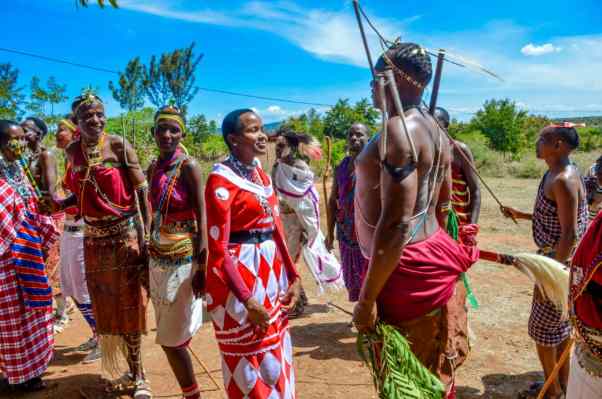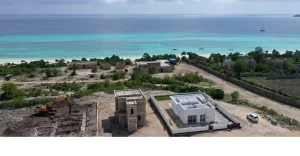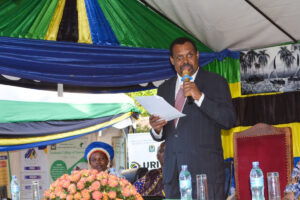All-round crusade against a regressive Maasai practice of ‘matrimonial slavery’ has earned a Tanzanian indigenous daughter, Ms Mesha Pius Singolyo, a National Ultimate Award.
Women in Law and Development Africa (WiLDAF) and the Legal Services Facility (LSF), the high-profile human rights defender organisations, have crowned Ms Mesha a champion of change in 2022 for her painstaking efforts in fighting against rampant child marriages within the Maasai pastoralist community.
“Mesha Pius Singolyo, an activist against child marriage, is a 2022 Champion of Change, and I am honoured to presenting her with an award,” said the LSF Executive Director, Ms Lulu Ngw’anakilala.
Mesha has been celebrated for her exceptional struggle against the widespread child marriages, rescuing 120 vulnerable girls from forced marriages in Monduli, Longido and Loliondo districts in Arusha Region, Tanzania.
Ms Mesha, a dedicated women’s rights activist, who fights against all forms of gender-based violence within the Maasai community, was born and raised among the Sonjo community, one of Africa’s most endangered indigenous groups inhabiting in northern Tanzania.

Going by the national census, the population of Sonjo ethnic group living within the Maasai community does not exceed 30,000. Like the Hadzabe ethnic group, a surviving relic of the hunter-gatherers remaining on earth, the Sonjo community basically survives on what nature provides, particularly wild fruits, honey, wild meat and a little bit of crops.
Having been born and bred where oppression against women is a norm, Mesha had to fight extremely hard against all odds to study and, as luck would have it, she has made it to the university level.
As you read this piece, Ms Mesha holds a Bachelor of Arts in Education, majoring in Political Science and Language Studies, a Master of Arts in Gender and Development Studies all from the University of Dar es Salaam, and a Master of Arts in Leadership and Education Management from Arusha University.
Secret behind her activism
Her background and the horrific murder of a 12-year-old Maasai girl at Ngorongoro area in Loliondo District 16 years ago after snubbing an arranged marriage are the factors that stirred her incredible dedication to fight against the harmful custom.
The girl, Sooi Sadira, from Soitsambu Village was killed on May 22, 2006, after she allegedly refused to marry a then 30-year-old man in a compulsory marital arrangement.

The planned marital union was allegedly spearheaded by her own father Sadira Kerembu, who stood to reap a number of cattle in the form of dowry from the potential suitor.
Police reports indicate that Sooi’s marriage was slated for May 2006, but prior to that, both the girl and her mother were said to have tried in vain to beg the aged Kerembu to at least let the girl grow up a little bit, he allegedly ended up silencing them by whips.
The tearful 12-year old Sooi was apparently sent to her ‘husband’ to start her new role as a housewife, a development that scared her stiff.
The girl is reported to have spent a few days at the man’s house, not knowing what to do and avoiding to go to bed with her suitor, who later got angry and forced her into a ‘rather painful act’ she had never experienced before.
The girl fled from her husband’s house, shedding tears and complaining that the night’s ordeal was too painful for her to bear. She returned to her father’s house only to be rebuked and scolded.

The father ordered Sooi to either ‘go back’ to her ‘husband’ or face a thorough beating.
As it happened, Sooi would rather endure her father’s beating than the painful experience she underwent as a virgin on her first marital night. However, the father decided to apply an even more effective measure onto her daughter.
He reportedly summoned a team of youth armed with flexible sticks and directed them to ‘discipline’ the girl. . . .This is yet another common ritual in the area.
The youth took the cue, tied both arms and legs of the girl before they proceeded to whip her thoroughly with bundles of flexible, yet solid, sticks known in Maasai vernacular as ‘njibi-njibi’.
She cried and begged for mercy, but the father, who stood by watching, ordered the young men to go on beating her.

In the Maasai community, when an elder (Laigwanan) has ordered something to be done, nobody is supposed to oppose it.
According to the police report, the girl’s mother just wept as she watched her daughter undergoing an extremely painful ordeal, which left the girl bleeding all over.
Following orders from the girl’s father, her tormentors poured cattle urine mixed with soda ash all over her body.
It was not clear whether this was to serve as further punishment or it was just a traditional method for healing wounds. Whatever that was, it proved to be extremely painful.

Meanwhile, another group of young men was boiling fat-laden herbal soup on the sidelines for the beleaguered girl to drink and regain her lost strength once she accomplished her punishment.
Unfortunately, the poor Sooi never lived to drink the special remedial soup. As soon as her limbs were freed from the tight ropes, Sooi reportedly asked for water to drink. She simply took the first sip and passed away.
“This is one of the most awful deaths caused by the child marriage practice in recent memory that I don’t want to neither remember nor forget. I was young, but I was scarred so much and resolved in my heart to fight against this vice,” Ms Mesha said.
My Dream, My Life
As a professional women organiser in Arusha Region, she has witnessed many girls dropping out of school, prompting her to establish a project dubbed My Dream, My Life, to prevent teenage pregnancies and physical, sexual and emotional violence and to engage girls in schools in a bid to increase their self-awareness on their biological development.
Official statistics show that a total of 64 per cent of girls in three districts of Monduli, Longido and Loliondo drop out of school due to early marriage and pregnancy.

“This phenomenal woman uses her network of friends to help girls who have fallen into the early pregnancy trap by sending them to school after giving birth. As we speak, Ms Mesha has successfully managed to bring back to school 32 victims of the matrimonial slavery, six out of them are young mothers,” Ms Ng’wanakilala explained.
Ms Mesha believes impregnated girls are more at risk of being married off and conceiving once again before the age of 18.
Thus, she helps them to gain access to education through private schools and enroll some of their children to childcare centres to relieve the young mothers of parental responsibilities and to focus on their studies instead.
For her, education is the only silver bullet that could protect the young girls from involuntary marriage.
“I don’t have much resources to provide all children in need of boarding schools. In recognition of that, I’ve been willingly working with my friends to raise sum of money for buying educational materials like books, pens and mattresses for the girls every year,” she said.

Ms Mesha dedicated the award to some community leaders, officials and friends who have been supportive to her call of defending indigenous girls’ rights to education for them to realise their lifetime dreams.
Being among the girls in her community, who managed to access rights to education, Ms Mesha has resolved to advocate for rights of women, children and youth especially on education and economic freedoms in Arusha Region.
Indeed, through Mesha’s work, women have attained their economic freedom as they can generate income and make decisions on their lives, including supporting their girls’ children at school.
Women’s economic freedom has been associated with the rights to education for their children.
“I’m grateful to see young girls I’ve supported become a flourishing seed planted in a fertile soil. Some at college, others are working and several are in secondary and primary schools. All are good ambassadors of every life matters by creating awareness to the community about harmful norms against girl child,” Ms Mesha noted.
Although she is currently pursuing a Master of Arts in Project Management at the Open University of Tanzania, she is skilled and competent in leaderships, gender programmes, education, entrepreneurship, micro-finance, community engagements, project management, research analysis and organising women and youth on development programmes
Share this news
This Year’s Most Read News Stories

Tanzania readying to talk to British developer over Zanzibar land lease revocation
Dar es Salaam. British firm Pennyroyal Limited has said it will sue the Tanzanian government over leasehold revocation in Zanzibar, but the Attorney General has confirmed that they are preparing to meet with the investor.Continue Reading

Karume faults lease of Zanzibar Islets
Diplomat Ali Karume has faulted the decision by the revolutionary government of Zanzibar to lease the islets that surround the islands of Unguja and Pemba to private developers saying it was absolutely not in Zanzibar’s national interests.Continue Reading
John Okello: From Zanzibar revolution icon to street beggar
In the final episode, we look at Okello’s ban in Tanganyika, rejection in Kenya tragic end in Uganda.Continue Reading











